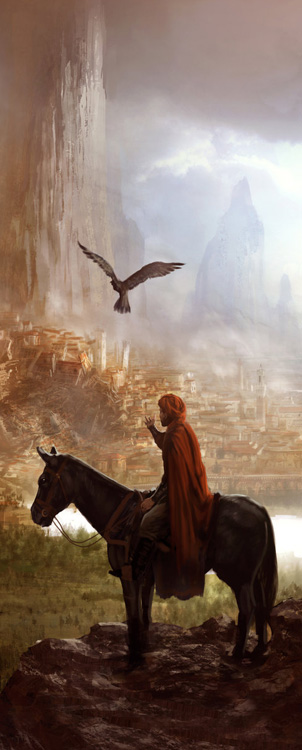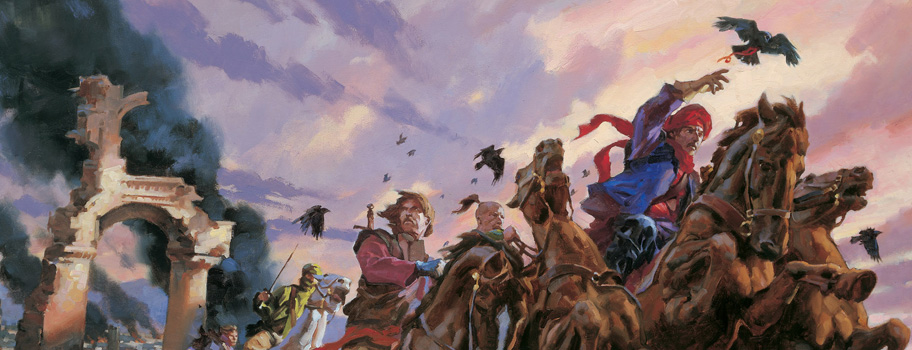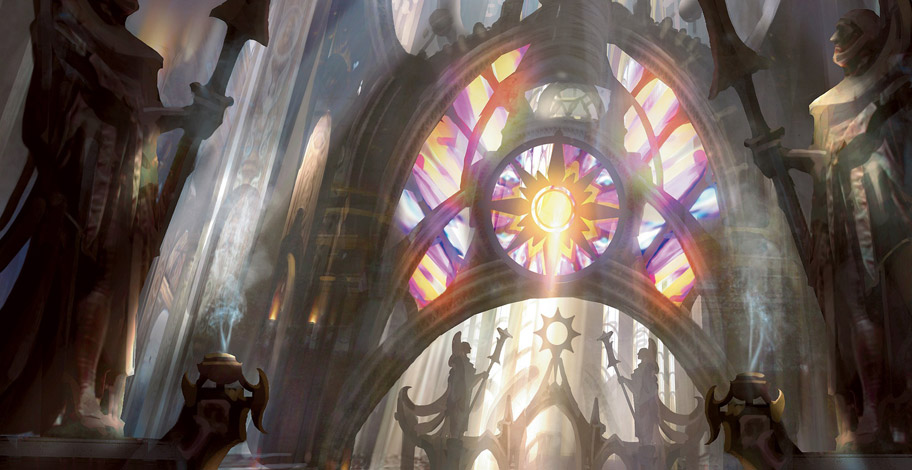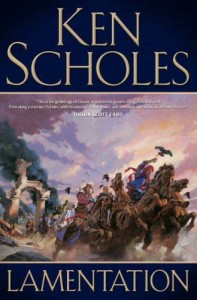I’m really grateful for Aidan’s invitation to come and guest blog here at A Dribble of Ink. When he approached me, we talked about a post on religion in fantasy, which is a rather broad topic – and one that’s of great interest to me. But as I’ve thought about it more and more, the topic has narrowed itself down to my own personal exploration of religion through the mechanism of writing. Anyone even the slightest bit familiar with my work will see that religion shows up in one form or another across my body of work, probably even more so than my other favorite exploration: apocalypse. Frequently, the two of them are hand in hand.
These days, I’m mostly known as the author of the series The Psalms of Isaak (hey, look at the religious language right there in the title!) but long before I wrote novels, I was slogging it out in the world of short stories with something in the vicinity of twenty stories published before my first novel found a home. And while one important aspect of my series is an exploration of the role of religion in human life and how it can be used as a weapon or tool, my short stories are wide-open playground jam-packed with far more opportunities to explore many of the “what-if’s” around the subject.

Of course, understanding something about me might help. Some folks mistakenly assume that the themes writers explore are indicative of a soap box those writers are preaching from. And to some extent that can certainly be true. But first and foremost, for me at least, writing has been the sandbox where I could play with ideas. And my writing life spans over thirty years of exploration – especially in the realm of faith. When I came to writing, I was a practicing Christian (initially of the Baptist flavor) and over the course of my time in that sandbox, I’ve moved through evangelicalism and fundamentalism into a more ecumenical Episcopalian framework (which also involved a large chunk of time spent as a preacher), eventually becoming a loose Universalist of sorts before embracing my agnosticism and atheism. And contrary to many of what my faith-based friends want to believe, it wasn’t a snap judgment or change of heart due to some grand disappointment in it all. It was a slow and often painful but expansively rewarding process. And it’s given me a very different perspective to someone who’s only lived in the rationalist or faith-based camps. I’ve been at home in both. Obviously, I prefer the one I’m in now to the one I used to be in. But I appreciate the benefits my former camp provided me at the time.
So with that perspective in mind, when I’ve written about religion in my work, it’s most often been a wide ranging exploration of my own inner landscape. Of course, there’s another reason to write about religion in a speculative framework – it continues to be a key part of human existence and the worlds and characters we create are more real when they are multi-faceted. Religion can also be a great source of inner and outer conflict, which makes it a powerful tool for storytelling. So let’s explore some of my…ahem…explorations.
One of the first short stories I wrote as an adult (back in college actually) was in the thick of my time as a Baptist minister. It was called “The Game” and it was a Deal with the Devil story wherein a man was granted long life, healthy, his dreams come true in exchange for his soul. But, the caveat was, that as long as he could beat the Devil each year at a game of chess, he could hold off collection on that debt. The “what if” I was playing with rose up out of the fact that every year, the Devil was losing on purpose because he enjoyed the annual game so much and because he considered the man his friend.
An epidemic of little personal gods gets the Big God jealous and brings about the sorts of things you’d see in Biblical Epics, set against the backdrop of a small town in Mississippi.
Later, after I’d come back to writing as a regular part of my life, I spent several stories immersed in religious themes. “On the Settling of Ancient Scores” was a God and the Devil Walk Into A Bar story where a human – aptly named Everyman – challenged them on their inherent conflict and the unfairness of using humans to play that out. In “East of Eden and Just a Bit South” I jumped into the story of Cain and Abel to tell the secret (and comedic) history of that myth and answer, once and for all, exactly what happened to Abel and how Cain exactly found a wife. The rather aloof and arbitrary “Good Ole Boy” God character in that story shows back up years later in “Grail-Diving in Shangrilla with the World’s Last Mime” wearing a Lorenz Rules t-shirt and living in a trailer in the woods. One of my personal favorites is a modern day exploration of idolatry in “That Old Time Religion,” in which an epidemic of little personal gods gets the Big God jealous and brings about the sorts of things you’d see in Biblical Epics, set against the backdrop of a small town in Mississippi.

I also explored the afterlife in a few stories, most notably my Writers of the Future story, “Into the Blank Where Life is Hurled,” which puts William Hope Hodgson and Harry Houdini (who had met and had a terrible experience with one another in real life) in Hell together, exploring the notion of an eternal soul with free will and what it would mean if you could move from one afterlife to another by making different choices.
And in my Santaman mythos (“The Santaman Cycle,” “The Doom of Love in Small Spaces” and “If Dragon’s Mass Eve Be Cold and Clear”) I invent a religion and its holy writ, set in an off-kilter fantasy world where things like love and hope can be stored in warehouses and the Bureaucracy tries to hold humanity together in the face of Black Drawler incursions and a shortage of resources. And where the Santaman rides forth in his red cloak and his avenging blade to save his people.
There was a marked difference in my explorations after 9/11. I started exploring the harder stuff – the ways that religion can do tremendous harm both to the people who practice said faith and to those who don’t if they’re on the wrong airplane or next to the wrong militant nomadic tribe. And the more subtle ways that Judeo-Christian and theistic privilege can work its way out in our culture…and the groups of people that haven’t fared well because of it.
It’s a fascinating sandbox that I’ve enjoyed playing in and I suspect I’ll continue to play there for some time. The explorations have stretched and grown me as a person and a writer, becoming reflections of my own journey. And really, I think we writers do our best work when we’re processing The Stuff of Life (which includes religion, politics, sex, and everything else we get up to) through the lens of fiction, creating more sandboxes to play in and making the stories we tell hum with humanity.
Thanks again for having me over, Aidan. And thanks, everyone, for dropping by.




Thanks, Ken.
I am shamefully less aware of your short fiction than your novels. Is there any chance of a short story collection so that we might more easily read these stories that you’ve mentioned? (You, sir, have breadth I did not suspect!)
Hey Paul,
Thanks. Yeah, a big batch of my short story has been collected into two volumes, LONG WALKS, LAST FLIGHTS AND OTHER STRANGE JOURNEYS and DIVING MIMES, WEEPING CZARS AND OTHER UNUSUAL SUSPECTS from Fairwood Press as Trade Paperbacks or e-books. There’s also a good scattering of my short fiction available online at Clarkesworld and Tor.com notably.
That was quite an interesting read. I think it’s amazing how little organized religion there is in SF/F, given how undeniably powerful an influence it has been (and continues to be) on human societies. I don’t particularly want to read religious fiction of any stripe, but I do want to see authors take religion seriously as a sociological, cultural and political force. Unfortunately, when it does happen, it’s often just as an “opiate of the masses” or “conduit for fanaticism.” I think if one studies history or has experience with deeply religious societies, then it’s quickly clear that there’s much more to religion than that.
Hey G, I think there’s quite a lot of it out there. The Sparrow, Dune, Job: A Comedy of Justice, Towing Jehovah, Canticle for Lebowitz to list some of my favorites right off the top of my head.
[…] Ken Scholes (A Dribble of Ink) with Explorations of Faith in the Sandbox of Fiction […]